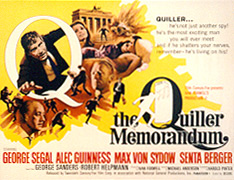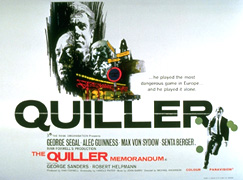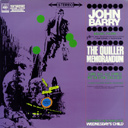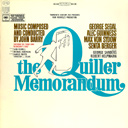  Spy Ink Spy Inkincludes
The Spy Fiction
Hall of Fame
|
|||
Cipher Room (Messageboard)
|
The Quiller Memorandum -- Film Reviews
 "The Most Dour Spy of Them All: The Quiller Caper
Richard Schickel, LIFE (1.27.67)
Elleston Trevor is the most successful literary double agent now in the business. Writing in the clear under his own name, he turned out non-spy thrillers such as The Flight of the Phoenix, a best seller that made a suspenseful movie. Under the pseudonym of Adam Hall, he created Quiller, the monomial secret-agent hero of The Quiller Memorandum, which won the 1965 Edgar as the mystery-suspense novel of the year and started what is taking on the aspect of a Quiller festival. A glossy movie of Memorandum is now in the theaters, and a second Quiller novel, The Ninth Directive, has just been issued in a manner suggesting his publishers, Simon & Schuster, expect Trevor to take his place in the Fleming-Le Carré-Deighton pantheon.
Toward that end, both the filmmakers and Hall seem to be trying to give more appeal to Quiller, who, besides having no first name, has no history, no life away from his lonely, difficult job—and a bare minimum of social graces. In a way this is too bad, for in Memorandum he had a certain originality as a fantasy figure. Basically he is the familiar good-bad guy, a fellow who has been a cowboy, private eye and freebooter in other rugged climes. But Hall has pushed this type well beyond the usual limits. John Le Carré's spies are softened by a spirit of existential suffering; Fleming, who viewed Bond as having no more sensibility than a cocked revolver, distracted us from his coldness by emphasizing his Lucullan tastes, his sexual prowess, his skill at cards. Quiller is nothing but a counterspy and gunsel—and not very nice.
He is such a pathologically distrustful type that he habitually refuses the aid his supersceret organization always tries to press on him when he is operating in a "red sector," or maximum-danger situation. He is, naturally, adept at all the arts of violence and self-defense. He is a student of psychology and physiology, interests which help him survive. His name bears a "9" suffix in his employers' files, meaning he is reliable under torture and can counter pain or drugs through his own discipline.
To make this brute palatable, Hall uses ferociously inventive plotting and a breakneck pace that allows little time for reflection on Quiller's unlovely nature. It is only in the aftertaste of one of his adventures that we realize we have been tricked into swallowing an embittered pill as a hero.
If he lacks human reality, he nevertheless is an effective symbol of the institutionalized violence of our times. But this symbolic effectiveness is somewhat diluted both in his screen incarnation and in his second novelistic exposure. Both are perfectly acceptable entertainments, even a bit above par. But neither of them has quite the weight that Memorandum had as a novel.
The film based on The Quiller Memorandum is faithful to the book's action. The lone agent, pitted against some very nasty neo-Nazis in Berlin, undergoes harrowing harassment before bringing them to book, proving, in one powerful scene, his inalienable right to the "9" suffix. But George Segal's Quiller, although a likable performance in a smart-alecky vein, lacks the hard center that should be at the spy's core. Segal is a young and bouncy actor, unable to convey a lifetime of ill use or the dankness of spirit such experience produces. Since Alec Guinness, as Quiller's control, is awfully self-conscious, and since Max von Sydow, as his chief nemesis, is perhaps a bit too broadly grotesque for the realistic mood of everyone else, it is only the ability of Director Michael Anderson to create a menacing atmosphere by purely cinematic means and then puncture it with sharply orchestrated action that lifts the film to the pleasant height it attains.
Problems like those of the film plague Hall in the second novel. His best material—Quiller's weird personality—is obscured, this time by an overwrought plot. The setting is Bangkok. Quiller is to prevent the assassination or abduction of a Very Important Englishman (Prince Philip?) on a goodwill visit. Embroidering this daring central ploy with a plethora of details, Hall stretches and stretches the string of the story.
The reader can suspend disbelief almost to the end, when Hall comes up with a resolution that is less than convincing. Worse, while fussing to save the story, Hall lets Quiller fade to a shadow of the person he was at the outset. Such disappearing acts are always disconcerting, but they are especially so when the writer has a gift for a genre that still has too few practitioners of his caliber.
 "The Quiller Memorandum"
Leonard Rubenstein, The Great Spy Films
The search for neo-Nazis in postwar Berlin would seem the last topic for futility or cynicism, yet as scripted by Harold Pinter from the novel by Adam Hall, The Quiller Memorandum depicted an espionage assignment that not only seemed to end as a failure, but a task that was designed without the prospect of success. Adding to this tone of despair was the casting of George Segal in the role of Quiller, an American-educated British spy whose relationship to his control, the stodgy Englishman, Pol (Alec Guiness), was a shade below outright hostility. Quiller had accepted the mission of locating the neo-Nazis since another spy, his friend, had been murdered by them at the film's opening. In his search for the clues, Quiller contacts the dead agent's girlfriend, a German schoolteacher, Inge (Senta Berger), whose friends included a former member of the neo-Nazi circle. Quiller's relationship to Inge was a critical element in the film, since it not only served as a pivot for the action, but also reversed the traditional pattern of romance in the spy film.
Quiller eventually meets the neo-Nazis and their leader, Oktober (Max Von Sydow), who is respectfully addressed by his subordinates as "Reichsführer," a reference to Oktober's rank in the past/present hierarchy. Drugged with different substances to gain information about his control's name and location, Quiller manages to confuse his answers with references to Inge, so that Oktober learns nothing. Whether a ruse or an honest mistake, Quiller is left abandoned near one of the rivers that divide Berlin and reports his contact with the enemy to Pol. Like the "Reichsführer" Pol was mainly interested in finding the exact location of his enemy's headquarters, since that was a clue to the identity of all their agents in Berlin. Using a luncheon bun as illustration, Pol coolly tells Quiller that he is in the middle of the fog that separated the two opponents while in contact with both. Using Inge's friend as a guide, Quiller locates the near-derelict mansion that serves as Oktober's base. Captured a second time by Oktober's lieutenants, Quiller is calmly released: Inge is being held as a hostage and Oktober's men are openly following Quiller to discover Pol's headquarters. Through car chases, taxi switches and abortive time bomb explosion, Quiller manages to reach Pol in his office overlooking West Berlin's Kufürstendamm. The neo-Nazi headquarters have been raided and Pol is pleased enough to offer nonchalantly that Quiller accompany him to breakfast. Quiller, tired from his dawn race with Oktober's thugs and worried about Inge, bluntly refuses. The police report on the raid mentions nothing about a female prisoner among their catch, and the next morning Quiller goes to the school where he had first met her. She is there, alive and unharmed, leading her charges back to the classroom, as they sing a children's song. As Quiller stares at her, the only noise on the sound track is the song, a cheerful yet ominous hint of the future.
The Quiller Memorandum had many of the merits of the traditional spy film: the suspense and adventure of hunting down Nazis twenty years after the war in the seat of their former glory, the confrontation of rivals who seemed equally well-organized and ruthless, the tensions between the Anglo-American Quiller and his haughty superior, the machinations in London of politicians like Gibbs (George Sanders), who engineer the spy war and the ambiguous romance between Quiller and Inge. The uncertainty of that affair was key to the sense of futility surrounding Quiller's assignment. Was Inge a born survivor, a neo-Nazi used to romance the opposition or a double-agent working for yet another side? Despite his apparent success, his skill in evading Oktober's trap, Quiller was left, as was the audience, with the feeling that the entire mission had been futile and meaningless. Underlying the film and particularly the casting of Segal in the title role, was a feeling that espionage was a horrid exercise, performed merely for the sake of form and the employment of highly placed officials and alienated adventurers. This desperation or failure of nerve on the part of the spy had been an important, though fleeting, ingredient of Hitchcock's Secret Agent, but was becoming the major theme of more modern spy films. Leamas at the conclusion of The Spy Who Came In From The Cold knew, at least, the background reasons for the intrigue that cost Nan's life and for which he sacrificed his own; Quiller and the audience were left ignorant of the real logic, if any, for his mission and of the feelings remaining between him and Inge. Isolation, despair and futility seemed to have replaced the adventure, drama and patriotism of espionage.
  The Soundtrack (released on CD in 1988)
As exciting as today's headlines and as new as tomorrow's. THE QUILLER MEMORANDUM has already been hailed as a classic screen spy-thriller. Base on the recent best seller by Adam Hall, this Panavision® and DeLuxe Color film stars George Segal, Alec Guiness, Max von Sydow and Senta Berger, with guest stars George Sanders and Robert Helpmann. The screenplay is by Harold Pinter, the celebrated young English playwright whose films "The Servant" and " The Caretaker" achieved great success.
Released by Twentieth Century-Fox, Ivan Foxwell's production of THE QUILLER MEMORANDUM deals with Berlin today -- where, in fact, it was largely filmed. Basically, it tells a provocative story of the recent upcropping of neo-Nazism in Germany, and of the British and American agents who work to uncover it in cooperation with the West German government. What sets THE QUILLER MEMORANDUM apart from other secret-agent films is its concern with a very real and contemporary problem -- the return of a political disease once headed by Adolf Hitler.
Not the least of the film's distinctions is the atmospheric music contributed by John Barry, heard in this Original Sound Track Recording album conducted by the composer himself. Barry's dynamic "new-sound" scores for James Bond films "From Russia With Love," "Goldfinger" and "Thunderball," as well as for "The Ipcress File." "The Knack" and "Born Free," among others, have established him as one of today's most sought-after film composers. The album also contains THE QUILLER MEMORANDUM's Main Theme in a vocal version, with lyrics by Mack David, sung by recording star Matt Monro.
tracks
Wednesday's Child Main Theme (2:10)
Quiller Caught - The Fight (2:48)
The Barrel Organ (2:39)
Oktober - Walk From The River (3:45)
Downtown (2:20) (T. Hatch)
Main Title Theme (2:03)
Wednesday's Child (2:35) (J. Barry - M. David) Vocal by Matt Monro
The Love Scene - The Old House (3:49)
Autobahn March (2:43)
He Knows The Way Out (2:16)
Night Walk In Berlin (3:03)
Quiller And The Bomb (2:33)
Have You Heard Of A Man called Jones? - End Theme (1:53)
|
||